📈 #26 Unlock your Operations Research career path in 10 minutes (from 5 years of real job data)
Without spending hours scrolling through LinkedIn.
Over the past 5 years, I have saved numerous job offers related to Operations Research that appeared on LinkedIn. In total, 176.
I don't know if that's many or few, but it seems like a representative sample of the reality that surrounds us.
And yes, I say saved. I have not even come close to submitting my CV to all of them. You might wonder why I've saved them, and I could tell you it was to be able to make this post.
But that's not the reason.
The reality is that I've saved them purely for entertainment. To see with my own eyes how the OR market is in different parts of the world and to get an idea of the skills that are requested, optimization problems that are usually solved, and, in general, the type of role that is in demand.
Of course, what lies behind this is understanding how I can adapt to that market demand, what my evolution could be, and what I might expect when looking out there.
And today I'm telling you everything, EVERYTHING, all I know here, on Feasible:
Skills, requirements, and tools that are requested
The average description you can find on LinkedIn
The most curious offers and the ones that have caught my attention the most
I hope all of this gives you many tools to steer your career as best as possible.
Once again… Let's go for it!
⚠️ Disclaimer ⚠️
I have saved job offers for 5 years. But if I have saved them, it's because somehow I liked them. That is to say, the first important point: these are not all the job offers in the world.
This means that any data is subject to being reinterpreted in future analyses of the Operations Research market.
With that said, let's get to it…
The first thing I want you to see is the big picture, the headlines, there will be time to go into more detail later.
You know, in total there are 176 job positions related to Operations Research in one way or another. The most common role titles, in order, are these 4:
(Senior) Operations Research Scientist (I put Senior in parentheses because it may or may not be in the title)
Data Scientist - Operations Research
Senior Data Scientist
Optimization Engineer
I have divided all the companies that appear in the offers into three large groups: small (up to 50 employees), medium (from 50 to 1000 employees), and large (more than 1000 employees). As it could not be otherwise, 80% of the offers come from large companies.
Among all the companies, those dedicated to software development (46), IT and consulting services (17), and retail (14) stand out, although there are also airlines (9) and logistics (6) involved.
As for educational requirements, mentions of Master's degrees above PhDs, and PhDs above Bachelor's degrees are prominent. It is true that in many offers it happens that they ask for a Master's and then it says that having a PhD is preferable, so we could say that the most normal thing is to ask for at least a Master's degree to access these types of jobs.
Regarding skills… Well, watch out, because one of the highlights is Machine Learning! (91), although above all is Python (126). SQL is also requested (73 offers ask for it).
If we specifically go to skills related to optimization, the ranking of solvers is as follows:
CPLEX (69)
Gurobi (56)
Xpress (48)
The number of offers in which heuristics/metaheuristics appear is similar to that of linear programming or integer programming (between 35 and 40 offers for each). And any of these skills is much more demanded than nonlinear programming or stochastic programming (only 1 or 2 offers).
And now that you have the general picture…
🤿 Let's Dive Deeper
Since there is a very wide range in terms of the experience requested, I have classified the offers in this area as: intern, junior, mid, senior, manager, and executive. What is normally requested in these ranges of experience?
For intern or junior roles: between 0 and 2 years of experience, open to recent graduates or with some short experience in optimization projects.
For mid roles: between 2 and 5 years of experience, and they are expected to have a slightly deeper knowledge of OR and have worked on some longer-term project.
For senior roles: usually between 5 and 10 years of experience are requested, starting to also ask for leadership responsibilities and a mastery in different areas of OR.
I have also found that those offers that request advanced degrees of studies (Master or PhD) usually count the years dedicated to research as total years of experience, although this is somewhat flexible depending on how close those studies are to the field requested by the company (logistics, financial, airlines, etc).
It has turned out like this:
I perfectly understand that there are not so many offers for managers and executives, truthfully. Although I believe that the revolution is beginning (as I have already told you in this post), OR is still niche, so it's hard to see leadership positions here.
I might be more surprised that a senior role is requested more than any other type of role, but precisely for what I just mentioned. If we add to this that it's very common to ask for a Master's or even a PhD, I think that many times demanding so much is shooting oneself in the foot. It could also happen that the data I have is biased by my own search.
Speaking of biases, probably the biggest bias here is the location. Since these are positions that I have saved without scientific criteria or rigor, I have saved those in which I could potentially fit in all aspects, and one of them was the location. Most are from Europe or the USA due to 1) geographical proximity to Spain and 2) the number of powerful companies there, respectively. I'll leave you the map anyway so you can see what I mean:
Most likely, there are many offers in other places. One that comes to mind is Brazil, and Mercado Livre would say it is the company that offers the most positions in this area. If any Brazilian buddy wants to share here how the market is in their country, raise your hand 🙋🏻
I told you that 80% of the offers come from large companies. I'm not telling you, I'm showing you graphically, which is cooler:
And being that the case…
I have chosen a subset of offers from large companies to analyze.
I'll tell you which ones (in no particular order): Amazon, Zalando, Ryanair, AstraZeneca, Pfizer, BBVA, Repsol, Maersk, Alibaba, Huawei, Delta Air Lines, Walt Disney, Instacart, Mercado Livre, United Airlines, Tesla, Apple, JP Morgan, Repsol, Starbucks, Walmart, UPS, TikTok.
The most important thing is that the most important thing is the most important. So yes, the word optimization is mentioned a lot in their offers, but Python, SQL, and Data Analysis also stand out. I haven't told you before, but probably Python stands out for two reasons: because there are many offers where Machine Learning is requested and because it is increasingly typical to use Python to model optimization problems. It is also normal to ask for SQL because one of the tasks of this job is to analyze and understand reality, and that is done through data. This data analysis combined with knowledge in OR leads me to conclude that what they want is to simplify data-based decision-making.
Also especially highlighted in these offers are communicative skills and project management. In my experience, especially communicative skills become particularly relevant in this area: you have to collaborate with cross-company teams, translate business needs into algorithms or mathematical models, and explain complex technical concepts to non-technical people.
As you see, roles associated with OR usually require a mix of hard (more technical) and soft (communication and management) skills.
As a last point, since the start of the Covid-19 pandemic, they say that the number of remote or hybrid job offers have grown. Well, OR has not been left behind:
🎯 How to succeed in searching for OR jobs
Look, I'm not going to beat around the bush.
I took all the job descriptions and asked ChatGPT to summarize the most common ones. This would be a typical job offer:
Title: Operations Research Scientist / Data Scientist
Location: [City, State, Country / Remote options available]
Company: [Company Name]
Industry: [Industry Type]
Job Type: Full-time
Job Description: We are seeking a highly skilled and motivated Operations Research Scientist / Data Scientist to join our dynamic team at [Company Name]. In this role, you will be responsible for developing and implementing advanced analytical models to solve complex operational challenges and drive strategic decision-making.
Responsibilities:
Develop and optimize algorithms and mathematical models to improve operational efficiency, reduce costs, and enhance overall performance.
Conduct data analysis and predictive modeling to inform business strategies and solve real-world problems.
Collaborate with cross-functional teams to integrate solutions into business operations and ensure alignment with organizational goals.
Communicate complex analytical concepts and findings to a diverse range of stakeholders, both technical and non-technical.
Stay abreast of the latest industry trends, technologies, and methodologies in operations research and data science.
Requirements:
Advanced degree (PhD preferred) in Operations Research, Applied Mathematics, Statistics, Computer Science, or a related quantitative field.
Proficient in programming languages such as Python and SQL.
Strong background in optimization methods, machine learning, and data analysis.
Excellent problem-solving skills and the ability to develop innovative solutions to complex issues.
Strong communication and project management skills.
Experience with optimization solvers like CPLEX, Gurobi, or Xpress is a plus.
Why Join Us: At [Company Name], we offer a collaborative and innovative work environment where your contributions are valued and rewarded. We provide opportunities for professional growth and development, along with competitive compensation and benefits.
If you're looking for a job in this area, I would search for words like:
Operations Research
Optimization Engineer
Linear Programming
Integer Programming
Constraint Programming
Mathematical Programming
Heuristics
Metaheuristics
CPLEX
Gurobi
With these, you will have swept a very wide spectrum of offers, I'm sure of it.
And that for searching them, but what happens when you have found them? Would you fit well in the offers?
The first thing to tell you is that there is no perfect candidate, just as there is no perfect company to work for. But if you have done your job well both in searching for a job and in focusing your career, you probably have a lot gained.
From the experience part, I always like to highlight that OR is like a toolbox: the more you have, the better. You will be able to better identify problems and their possible solutions, you will be more efficient, and you will also find more creative solutions.
For me, there are 4 essential areas in optimization that you should have more or less clear:
Heuristics/metaheuristics
Linear Programming (or LP)
Integer Programming (or IP, MIP, or MILP, also for Mixed Integer Programming, and Mixed Integer Linear Programming, respectively)
Constraint Programming (or CP)
If you master them, there will be no problem that can resist you.
💡The most striking job positions
There are certain very typical sectors in which to apply OR. If I have to name one, it would be logistics. In fact, on more than one occasion I have talked to you about TSP or VRP, which are typical problems faced by any logistics company.
But there is room in other areas as well.
What is most striking is to see OR offers in entertainment companies or even social networks.
I have emphasized very typical aspects such as optimization, but OR is more than that. Under the umbrella of OR, we can find game theory, queue theory, simulation…
And all this comes together in an offer I saw some time ago for Walt Disney. Almost a year ago, they were looking for an OR engineer to improve the user experience in their theme parks. Who wouldn't want to work in Florida and occasionally go to Walt Disney World park in Orlando?
The offer does nothing more than reflect the intricate logistics of their parks and the complex decision-making processes that occur there.
I was also struck by the one from TikTok… And watch out because it's still active! I leave it here, in case you want to submit your CV and earn a real salary of between $136,000 and $240,000 🤑. But if so, tell me about the experience!
Okay, you'll say it's for logistics, warehouses, etc., etc. But what does it have to do with TikTok's business? Can someone explain it to me?
In any case, these offers reveal the limits of OR. Increasingly diverse sectors see in it a potential ally to improve their operational efficiency, solve complex problems, and analyze reality through data to make informed decisions.
🏁 Some conclusions
Today I have shown you a summary of 176 job offers related to OR that I have seen over 5 years on LinkedIn. If I can contribute something to all this summary in these final lines of the article, I would tell you:
Expose yourself to diverse problems, thus forcing you to the next point.
Expose yourself to different problem-solving techniques.
OR is taking a very relevant role in companies thanks to the rise of data use for making informed decisions.
It's an area that requires a lot of learning, take advantage of it, it's very fun.
Despite all this, I recognize that the analysis of all these offers is completely biased to my tastes and my opinions. What have you seen in the OR job market?
Anyway, in anything I can help you with, you know, leave me a comment right here.
See you soon,
Borja.





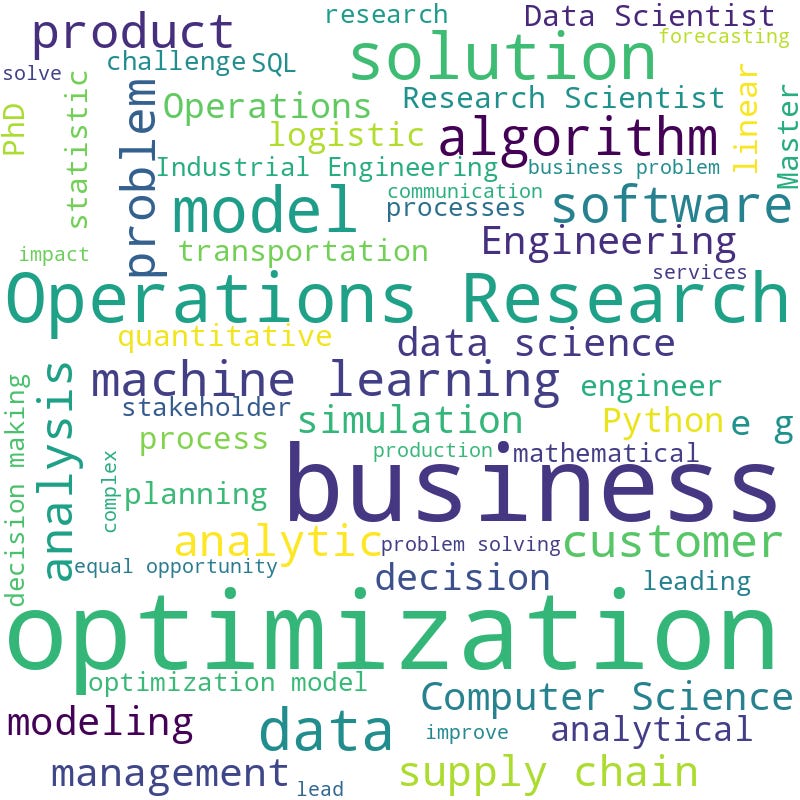
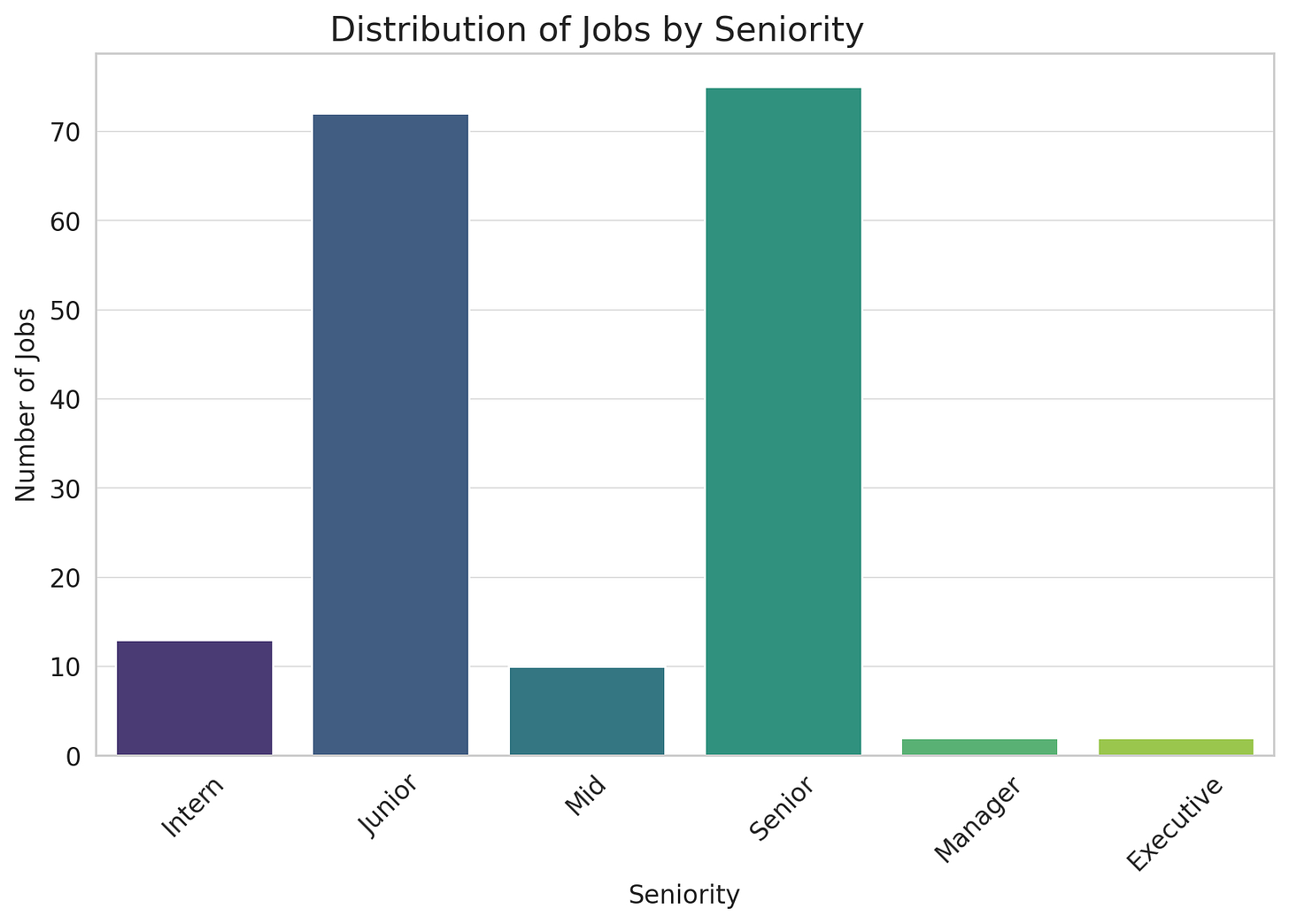
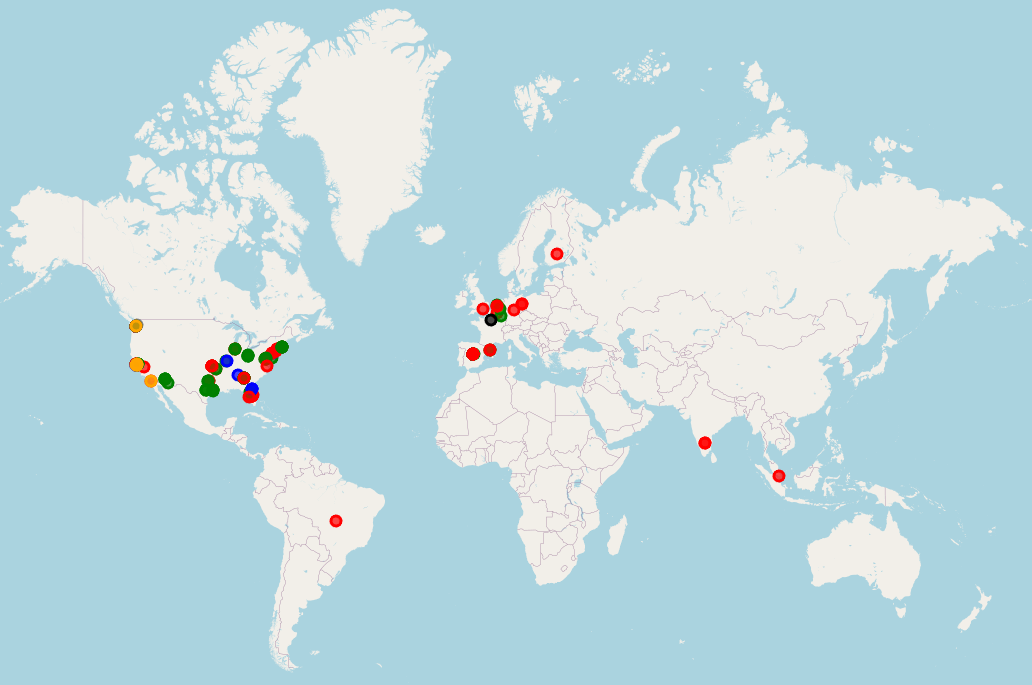
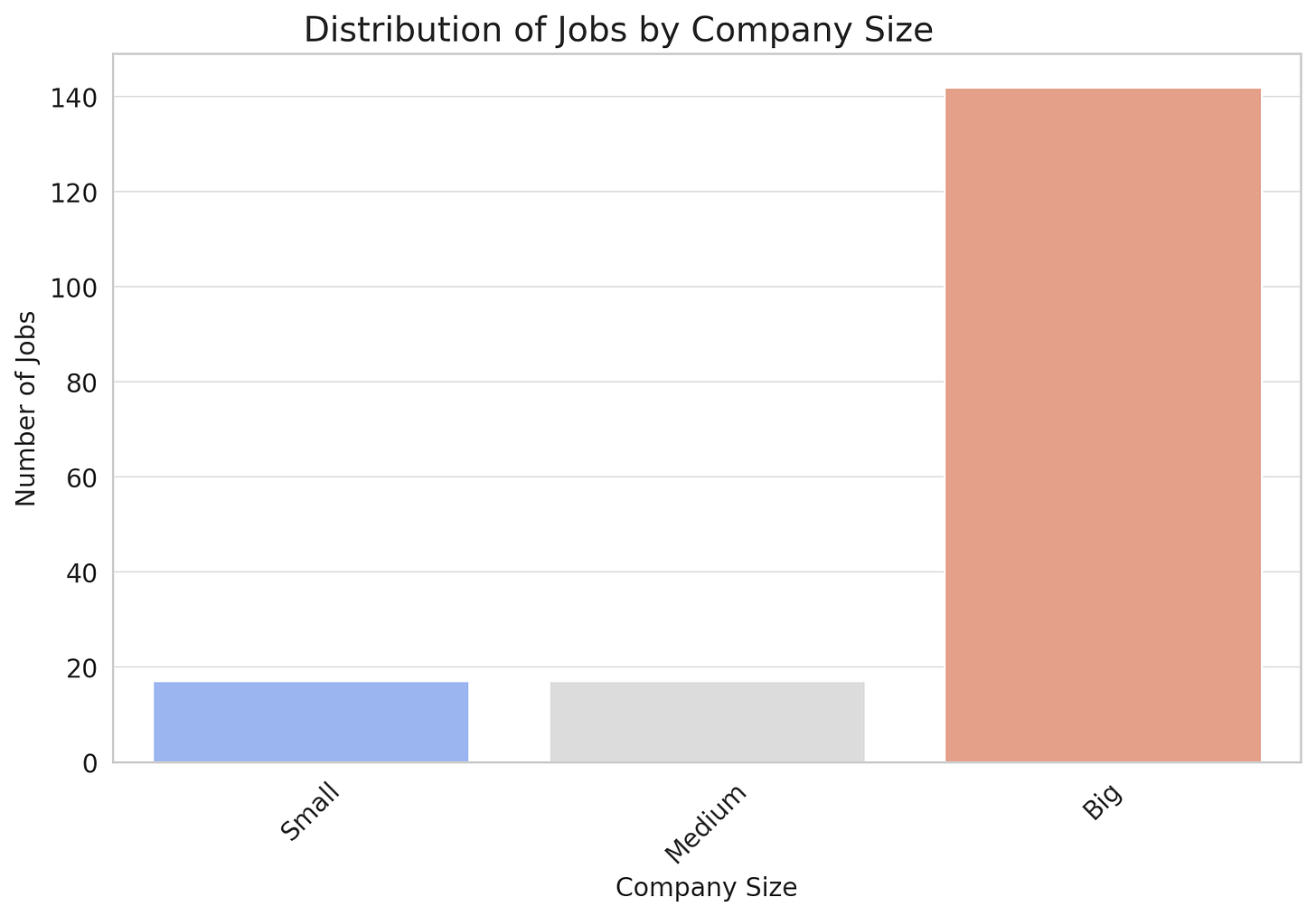
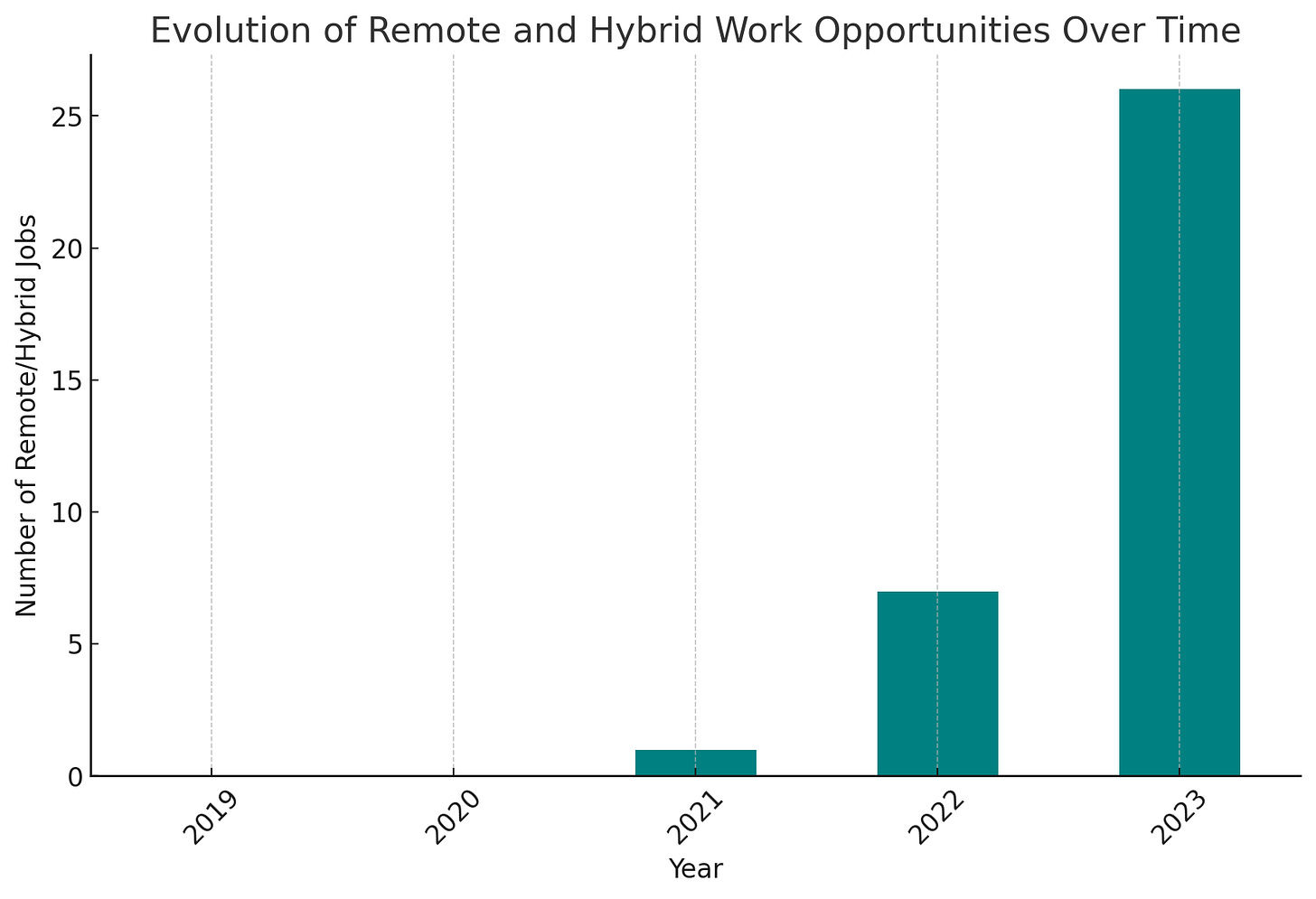
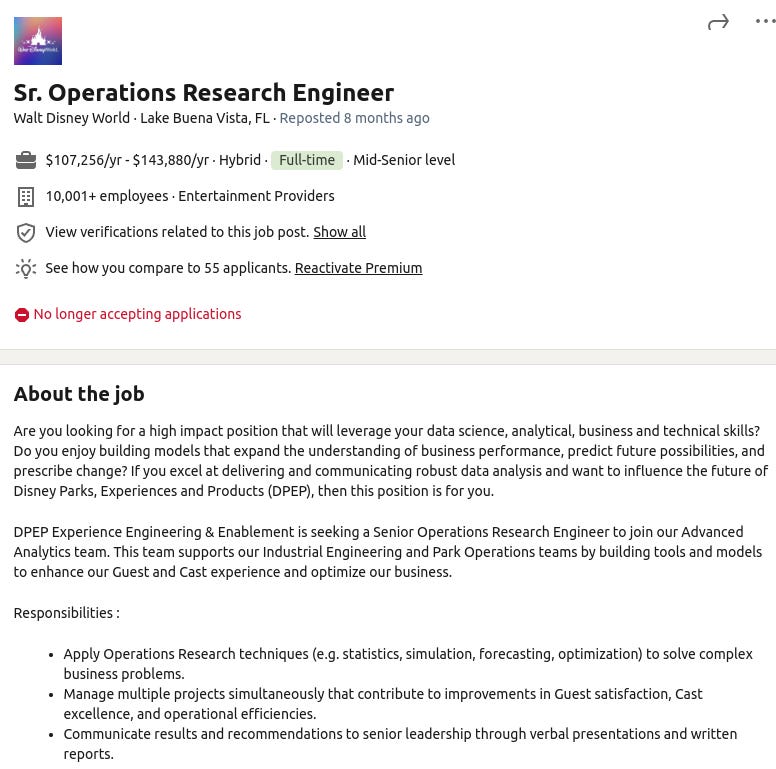
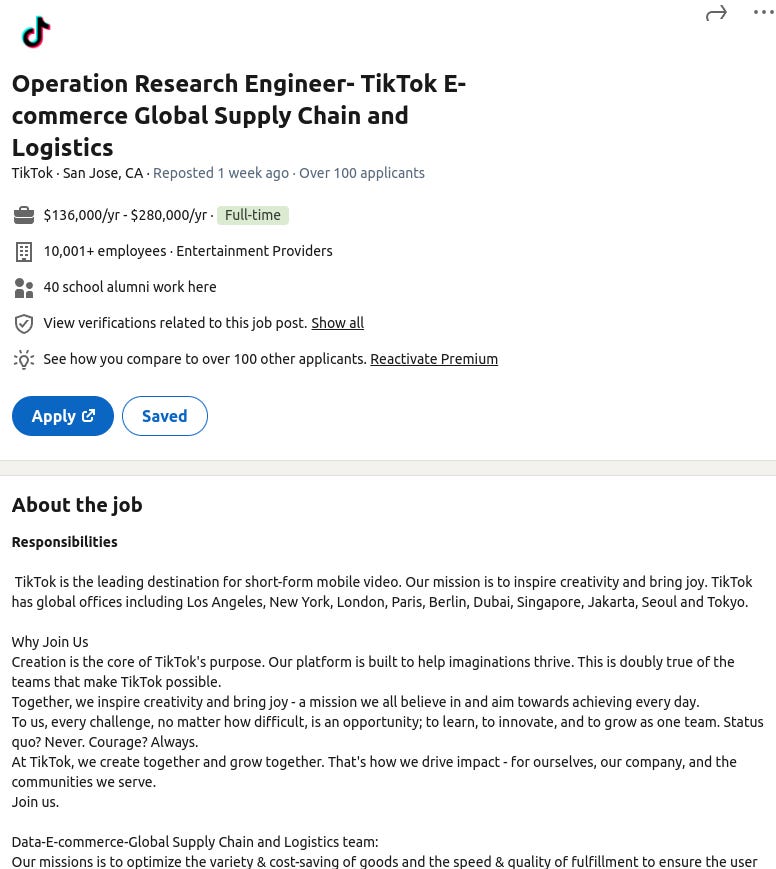

thank you so much for this article , as a master student in OR it is so helpful .